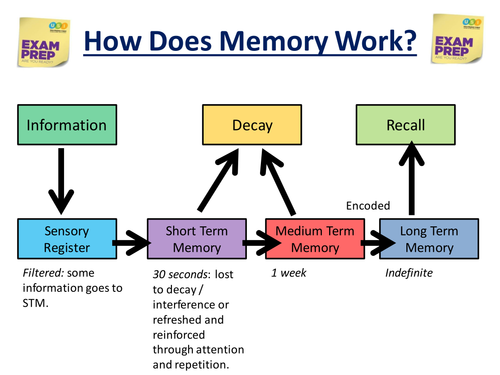
Looks at different memory games to get them thinking about how their memory works - then explains how short term memory and long term memory work and how things can interfere with their memory.
My class really enjoyed this - both the memory games and how it applies to revision. They came away with a better understanding of strategies to use for revision.
Something went wrong, please try again later.
A clear explanation but quite few inaccuracies due to the fact that this is not based on current research. The most serious inaccuracies: (1) the items that working memory can handle at any one time are not 7 for the average human. The number, based on Miller (1956) research has been revised by contemporary researchers to 4 items on average. However, it is not the simply the number that matters; the effectiveness of working memory depends on the key processes regulating retrieval (e.g shifting and inhibiting); (2) information decays from working memory after much less than 30 seconds (this is also an old figure). The list could go on but I do not want to sound pedantic. One major shortcoming: way too much information; if you are aware of the basics of memorisation and learning, as you will be aware that 50 % of what we learn is lost after 20 minutes from first processing it; hence, this PPT is way too long, has very little recycling built into it (the most important factor in preventing decay) and contain too much information for effective learning to happen. I personally think that the author should have heeded the very recommendations she makes in her PPT when she designed it. I recommend updating it in the light of current research - this is truly passe'; add in Ebbinghaus curve indicating human forgetting rates; build in a section of effective memory strategies (see Oxford, 1990; Ellis 2000; Eysenck, 2014) and recycle key info a bit more.
Thank you for publishing your resource. It has been selected to be featured in our revamped <a href=/teaching-resources/gcse-exam-revision> GCSE revision hub</a>.
to let us know if it violates our terms and conditions.
Our customer service team will review your report and will be in touch.
